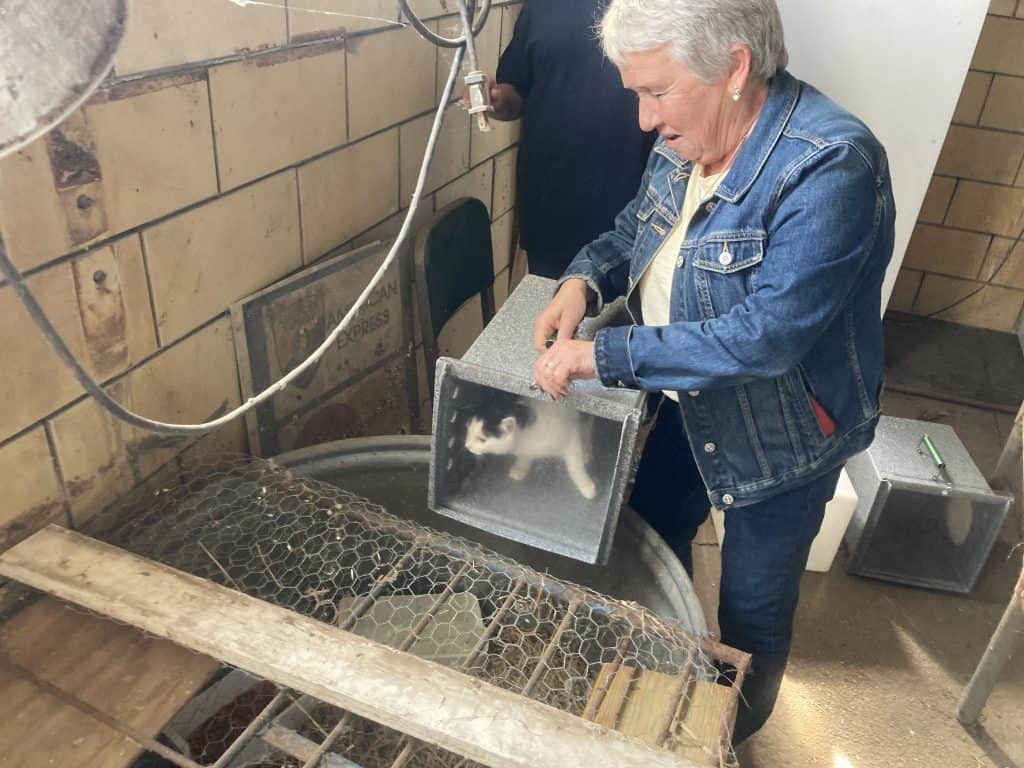

Take a stroll through the Burlington County Agricultural Center and you’ll see plenty of sheep and tractors and other sights and sounds typical of a working farm.
Just don’t go looking for mice. Charlene Carlisle hasn’t spotted one for some time now.
Charlene and husband Ken are longtime tenant farmers at the Agricultural Center, where they raise sheep and grow crops on parts of the Centerton Road site’s 68 acres.
“Rodents were once a big issue; not anymore,” she says, smiling.
You see the Carlisle family has a secret weapon to keep rodents away. Multiple secret weapons actually: working cats rescued from the Burlington County Animal Shelter and released onto the Agricultural Center grounds and barns to help manage the rodent population.
“It’s been a great win for us,” said Carlisle about the animal shelter’s barn cat program. “We don’t have to use any poison at all. It’s all cats. And it’s worked out great for us.”
Started in 2014, the program has placed cats at several farms throughout the county and the shelter is hoping additional businesses might participate and accept cats to help manage mice and other rodents in their warehouses, breweries or grounds.
“Our Burlington County Animal Shelter staff and volunteers do a fantastic job caring for animals that are lost, surrendered or strays and placing them into new homes with loving families,” said Burlington County Commissioner Dan O’Connell, who is the liaison to the shelter. “But we know that some cats just aren’t able to live as traditional indoor house pets, so this program offers a healthy alternative. It’s not a typical adoption, but it gives these animals what they want and need – a safe sheltered home where they can live happily with limited human interactions.”
“Cats are natural predators for rodents found at farms, warehouses, breweries and vineyards,” added Burlington County Animal Shelter Director Ericka Haines. “Our barn cat program offers a win-win for everyone. The cat finds a suitable place to live outside a traditional indoor house and the farmer or business receives a natural remedy for mice and other problem pests.”
Farms and other businesses interested in participating in the barn cat program are encouraged to contact the Animal Shelter at 609-265-5073. There is no fee for the cats.
All businesses are inspected by shelter staff to determine their suitability, and the cats are specially selected based on their age, physical condition and behavior. Like all animals adopted out by the shelter, they are all vaccinated and spayed or neutered.
Before being released, the cats are typically crated at their new locations for about two weeks so they can become safely acclimated with their surroundings. Afterwards, owners typically have little interaction with the cats, save for leaving out food for them.
“These cats are accustomed to fending for themselves, so there’s very little for their new owners to do outside the first few weeks when the cats need to remain crated,” said Haines. “There’s really little fuss and the cats themselves can be quite helpful with controlling rodent populations. They really are working cats who just need food and a safe structure where they can live. Working farms with barns are ideal, but cats can also be suitable for feed stores, plant nurseries, warehouses, factories, workshops, breweries, art studios, offices and other properties where independent-minded cats might be welcome.”
Charlene Carlisle says the cats at the Agricultural Center get along fine with the sheep in the barns and have become welcome additions to her family’s farming operation.
“You see them around and they do quite well for themselves, but I still put out food for them,” she said.









